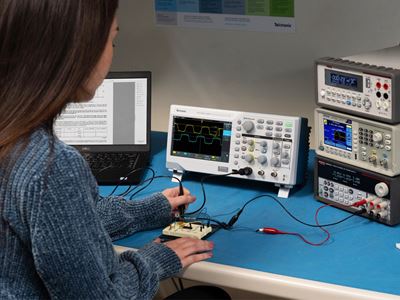 a Tektronix data acquisition system with an oscilloscope and test equipment on a lab bench" width="400" height="300" />
a Tektronix data acquisition system with an oscilloscope and test equipment on a lab bench" width="400" height="300" /> a Tektronix data acquisition system with an oscilloscope and test equipment on a lab bench" width="400" height="300" />
a Tektronix data acquisition system with an oscilloscope and test equipment on a lab bench" width="400" height="300" />
Data Acquisition (DAQ) is the measurement of electrical or physical things like voltage, current, temperature, pressure, sound, or motion. Converting these signals into digital data is necessary to analyze and store them for further processing. DAQ systems are essential for a wide range of applications, from scientific research and industrial automation to environmental monitoring and medical diagnostics.
Data acquisition plays a pivotal role in a wide array of sectors, enabling the precise measurement and analysis of various physical and electrical phenomena:
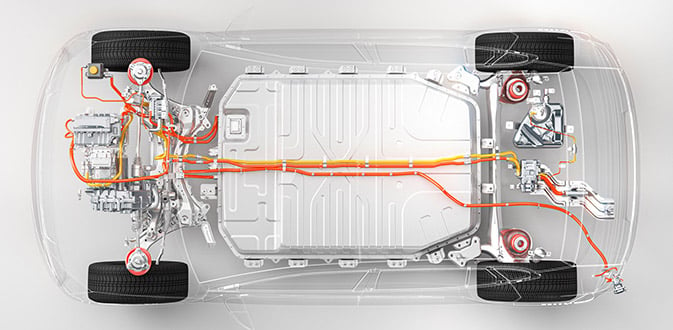
Overall, the utility of data acquisition extends across various industries, underscoring its importance in applications that require detailed, accurate, and dependable data collection and analysis. Whether it's advancing scientific research, optimizing industrial processes, protecting the environment, ensuring safety in automotive, aerospace and defense, or aiding medical diagnostics, data acquisition technologies are indispensable.
A DAQ (Data Acquisition) system is a set of components and devices used to measure and collect data from various sensors or transducers. It involves the conversion of physical or electrical signals into digital data for further analysis and processing.
A typical DAQ system consists of three main parts:
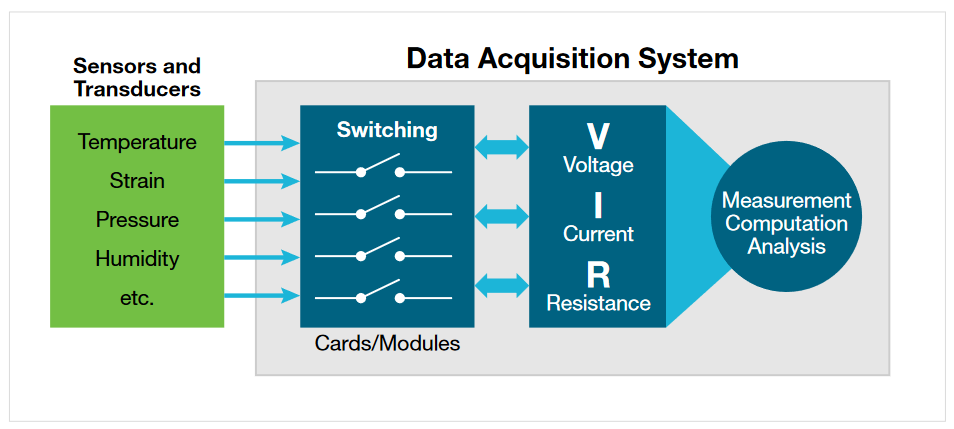
DAQ systems are used in a wide range of applications, including scientific research, industrial automation, environmental monitoring, aerospace and defense, and medical diagnostics. They play a crucial role in measuring, analyzing, and controlling physical or electrical phenomena, enabling researchers, engineers, and technicians to collect and analyze data accurately and efficiently.
Selecting the right Data Acquisition (DAQ) system is crucial for obtaining precise and reliable measurements in various applications. The effectiveness of a DAQ system lies in its ability to accurately meet specific measurement requirements, which involves considering several key factors:
By carefully considering these aspects, you can choose a DAQ system that not only aligns with your specific needs but also ensures a balance between performance, versatility, and budget. This approach guarantees that the selected system can effectively and efficiently handle the required data acquisition tasks.
DAQ systems are instrumental in capturing and recording data from various sensors, crucial for monitoring physical or electrical phenomena. These systems empower engineers with data-driven insights, allowing them to make more informed decisions in areas such as:
Data Acquisition systems today benefit significantly from advanced self-calibration techniques, which employ third-order polynomials. This innovative approach greatly enhances the accuracy of measurements by auto-adjusting calibration coefficients based on predetermined input signals. Such accuracy is indispensable in sectors where precise data collection is critical, including aerospace, defense, and automotive applications.
Isolation plays a pivotal role in ensuring the accuracy and reliability of DAQ systems. It involves shielding the measurement circuits from potential distortions like electrical noise and voltage discrepancies. Employing isolation techniques, such as galvanic and magnetic isolation, is crucial, especially in high-voltage environments or areas susceptible to electrical interference, to maintain the integrity of the data collected.
Maintaining the integrity of measurements is a fundamental aspect of data acquisition. DAQ systems often incorporate advanced isolation methods to protect sensitive measurement components from external electrical disturbances. By establishing either physical or electromagnetic barriers, these systems prevent noise or voltage fluctuations from impacting the accuracy of the data, a necessity in environments with high electromagnetic interference or unstable electrical conditions.
Signal streaming and remote monitoring are groundbreaking advancements in the realm of DAQ. High-speed signal streaming facilitates the real-time capture and analysis of data, essential in dynamic and demanding testing environments. Additionally, remote monitoring capabilities enable operators to manage and visualize data remotely, enhancing operational flexibility and efficiency, particularly in complex, continuously monitored systems.
Keithley Instruments provides a range of advanced data acquisition systems, known for their accurate measurement capabilities, fast scanning, and versatile setup options. These systems are designed to cater to various measurement and analysis needs in fields like scientific research, industrial automation, and more.
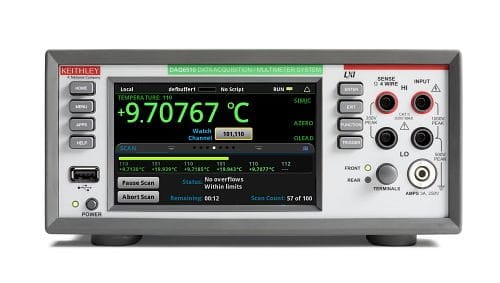
The Keithley DAQ6510 defines versatility in data acquisition, consolidating a suite of essential functions into a singular, robust unit. This system is engineered to cater to a range of measurement needs with standout features that include:
Designed for scenarios requiring comprehensive and varied data collection, the Keithley DAQ6510 excels in providing enhanced connectivity and seamless integration with diverse systems. Its ability to handle multiple channels and maintain a rapid scanning rate positions it as a prime choice for extensive data acquisition tasks.
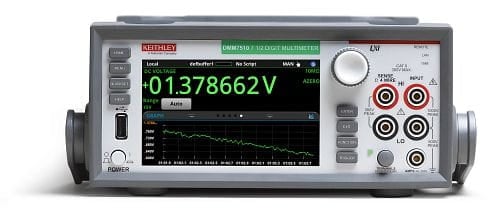
The Keithley DMM7510 combines the functionality of a precise digital multimeter with a real-time sampling oscilloscope. Key features include:
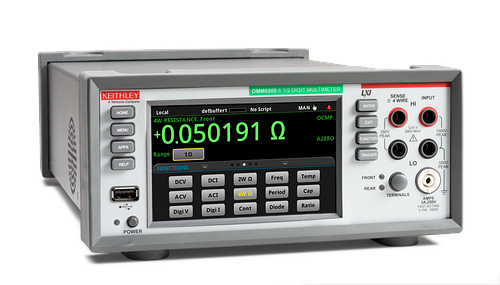
The DMM6500 61⁄2-Digit Bench/System Digital Multimeter is another key offering from Keithley. This multimeter is particularly useful for applications that demand high-speed measurements and multiple parameter tracking. It is notable for its flexibility, functioning both as a standalone instrument and as part of a larger DAQ system. Its capabilities include:
Each of these systems from Keithley Instruments brings unique strengths to the table, enabling efficient and accurate data acquisition for a variety of applications.
High Accuracy: Keithley Instruments' DAQ systems are designed with high-precision components, including high-resolution ADCs, stable reference voltages, and high-quality signal conditioning circuits, to ensure accurate measurements.
High-Speed Scanning: Keithley Instruments' DAQ systems are capable of high-speed scanning, allowing for fast data acquisition and analysis. This makes them ideal for applications that require real-time monitoring and control.
Flexible Configuration: Keithley Instruments' DAQ systems are designed to be flexible and configurable, allowing users to customize the system to meet their specific measurement requirements. This includes the ability to support multiple sensor types, input/output configurations, and signal conditioning options.
User-Friendly Software: Keithley Instruments' DAQ systems come with user-friendly software that provides data visualization tools and supports multiple programming languages. This makes it easy for users to control and analyze the data from the system.
Industry-Leading Support: Keithley Instruments is known for its industry-leading support, including comprehensive documentation, technical support, and training programs. This ensures that users can get the most out of their DAQ systems and achieve optimal performance.
Overall, Keithley Instruments' DAQ systems are leading the way in terms of accuracy, speed, flexibility, and user-friendliness. Keithley Instruments' DAQ systems are great for many uses, like research, automation, and data collection in different industries. They have powerful parts, can be set up in different ways, and have easy-to-use software. to data acquisition and analysis. to aerospace and defense.
In the diverse landscape of modern technology, Data Acquisition (DAQ) stands as an indispensable tool across various sectors. From enabling precise measurements in scientific research to optimizing industrial processes, ensuring environmental integrity, and advancing medical diagnostics, DAQ systems have become crucial. Their advanced calibration, robust isolation, and innovative features like signal streaming and remote monitoring exemplify their versatility and adaptability. As the demand for accurate and reliable data collection grows, the importance of DAQ systems in facilitating informed decision-making and driving technological advancement becomes increasingly evident.